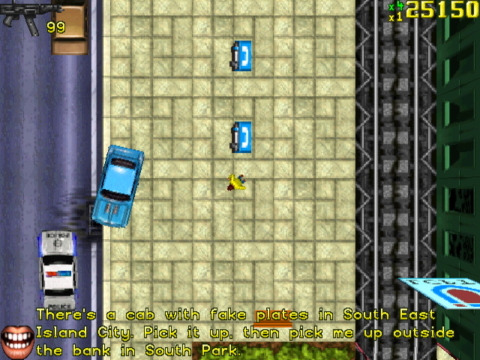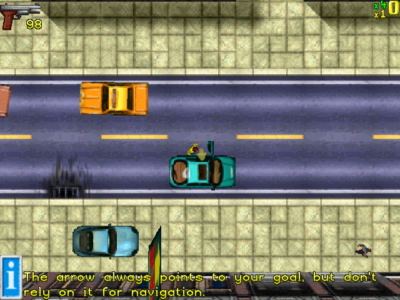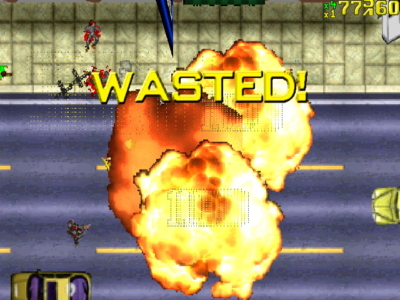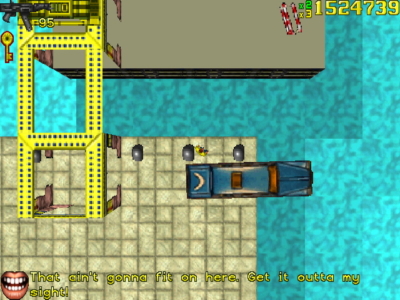
Grand Theft Auto
Written by: Rik
Date posted: February 2, 2004
- Genre: Action
- Developed by: DMA Design
- Published by: BMG Interactive
- Year released: 1997
- Our score: 6
In case you didn’t know, Grand Theft Auto sees you take to the streets as a filthy lowlife with nothing better to do than make them as unsafe as possible. The game takes place within a working city, with people apparently going about their daily business: driving around, stopping at red, honking angrily at other motorists – all just waiting to be unsettled by yours truly. And unsettle them you will. There are cars to be stolen, people to be run over, police chases to be involved in and antisocial behaviour a-plenty on offer.
Fun though this is, if you want to get anywhere in the city you have to get involved in its criminal underworld. You take on missions by answering payphones dotted around the place, and then you get set for a whole lot of trouble. If you manage to avoid getting run over, blown up or arrested, there’s still the small matter of doing what you’re supposed to. And once it’s mission accomplished, there’s plenty more where that came from. That, in a nutshell, is what Grand Theft Auto is all about.

In honour of the screenshots that originally accompanied this review, here we are, a few minutes into the game.
But is it any good? Well, it’s certainly original, which is probably why it was so well received in the first place. The real star of the show is the city. When you first start out you feel like you can do anything. Each of the three cities is pretty large, and you can spend a fair amount of time just exploring them. While you do this it’s fairly likely you won’t be sticking on the right side of the road and stopping at the lights, and soon you’ll be seeing just how much mayhem you can create. It’s really good fun for the first few hours, and the attention to detail is pretty impressive. The cars all handle differently; sports cars are nippy, but they damage easily, while trucks are durable but drive like a dog. Speaking of which, damage is reflected in both the appearance and engine note of your vehicle. Cause a scene and not only will the police turn up, so will an ambulance and a fire engine. And yes, you can nick those too.
Once you’ve wreaked your fair share of havoc, you’ll start to see what you can actually do beyond that. Early signs are good: the initial missions are reasonably forgiving, and you soon start to build up a little cash. In addition, if you managed to venture down to the docks during those excitable early hours, you’ll have noticed that you can also sell the cars you steal, and this also appears profitable, especially if you manage to avoid crashing them before you get there. This combination of missions and flogging stolen motors is initially satisfying until you realise that you’re still a million miles away from getting enough cash to finish the first city.
Herein lies the problem. As I said earlier, if you want to get any further you’re going to have to complete the missions. It’s a little disheartening to find out that the game isn’t quite the free-for-all jaunt in the city you first thought, but on the surface of things mission-based play is perfectly acceptable. In GTA, however, it’s implemented quite badly. There’s nothing necessarily wrong with the missions themselves – in fact, they’re pretty varied – but they can be quite tough, often with several different stages, and if you should happen to fail one, you don’t get another shot at it. Furthermore, there’s no mid-level save, so even if you know what you’re doing, it takes a good few hours of play to get anywhere. The upshot of all this is that you can find yourself in the middle of the city with no ringing phones left and no way of getting to the next level. In this case your only option is to start over and plough through all the easy missions again (and screw them up if you’ve got a temper).
Some have bemoaned the age of the quick-save, arguing that it takes the challenge away (or something), but GTA leans too far in the other direction. When a game starts to become a chore it’s difficult to blame the player for leaving it alone and doing something altogether more worthwhile. Consequently, you may find yourself getting bored pretty quickly.
If you do make it further into the game, chances are you’ll have quite a lot of fun, but you’ll also encounter other problems that further undermine your enjoyment. The most significant of these involves navigation, which becomes more important as you progress. In the game a small arrow in front of your car points directly to your next destination, which is pretty helpful except that it doesn’t take into account water or impassable objects. To navigate successfully you’ll have to use the city map (on paper, provided with the game), not easy when you’ve got five cops on your tail. Would an in-game map have been so hard to implement?
So, then, Grand Theft Auto was almost certainly overrated on release. However, its undoubted potential has now been realised in the next-generation sequels, GTA 3 and Vice City. Not only do they add 3D graphics and an all-star cast (among other things) to the mix, but they also remedy the flaws of the original by offering a more forgiving mission structure, an in-game map and the chance to save more frequently. If GTA had done this, it would be much more worthy of the praise it was initially accorded.




 Posts
Posts